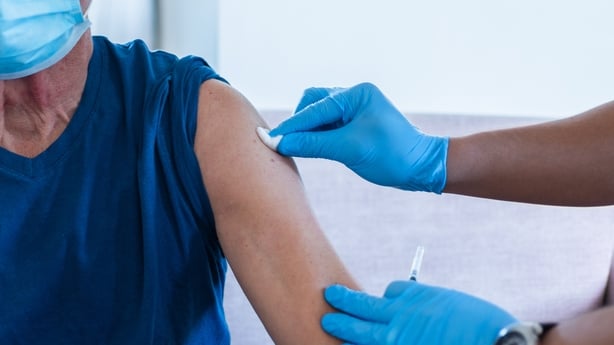The Health Service Executive has warned of a new variant of Covid-19 named Eris, which it said has been associated with 644 new cases of the virus over the past week, a 50% increase over the previous week.
It has also been associated with outbreaks in hospitals.
However, there is no evidence of an increase in the severity of infection and the Government is not planning public health restrictions.
Speaking on RTÉ's Morning Ireland, Chief Clinical Officer of the HSE Dr Colm Henry has said there has not been any surge in intensive care admissions due to the variant but it is being attributed to an increase in community transmission in recent weeks.
It is normal for viruses to mutate, he said, calling Eris a variant of Omicron which has already been seen in hospitals.
Mutations displace the existing variant of a virus, he said.
"What we're seeing now is this, EG.5. It's a derivative of the known variant Omicron variant, and it is more transmissible and certainly driving community transmission in recent weeks," Dr Henry said.
"Not just here, but internationally and accounting now for a significant proportion of increased hospital activity of Covid-19," he said.
He added that so far there is no evidence that Eris is more deadly or produces more serious illness.
"The WHO have labeled this sub-variant a variant of interest, meaning they'll be enhanced surveillance across all member states to see if there's any more serious illness, if it's driving increased admissions to intensive care units, and if healthcare systems are under pressure," he said.
"But so far, there's no evidence of this, and based on our experience to date, we know that we have a much more robust population immunity from both natural infection and from vaccination, and that should stand to our advantage with the surge in cases we're seeing out in the community, which are translating in lower numbers to hospital admission and certainly not seeing any surge in intensive care admissions as yet," Dr Henry added.

Dr Henry advised those who are vulnerable to get vaccinated, adding that individuals who feel ill, especially if they work in the healthcare sector, should remain at home.
He said if Eris "turns out to be a much more serious illness, then it's a significant problem for people, for vulnerable people, for a healthcare system, if it's transmitted".
"If it mutates into a variant that's just easier to catch, but not more serious, then we'll see a surge in community transmission and if enough people catch it in the community, we will see some vulnerable people end up in hospital and that's what we're seeing now," he added.
However, he noted that no surge in presentations or conversion to intensive care patients has been reported so far.
Booster
Winter poses an annual concern regarding illness, last year saw a surge in Covid-19 infections which coincided with a particularly high number of influenza and RSV cases.
This placed healthcare systems right across the world under extraordinary pressure, he said.
Dr Henry said coming into the winter season plans were in place to alleviate pressures on the heathcare system such as enhanced co-operation between community and hospital services alongside a rollout, in the Autumn, of a Covid-19 vaccination program aimed at those who are most vulnerable and most at risk of serious illness.
He said a booster vaccine will be available from the end of September onwards for those aged 50 or older, individuals with a comprised immune system aged 5 and above, people with medical conditions that place them at a higher risk of a serious illness from Covid-19 and healthcare workers.
The booster will administered in tandem with the flu jabs, he added.
He said there were no reasons why the vaccine should be any less effective against Eris.
"But the vaccine we intend to use for this coming autumn season is under evaluation by the EMA, and that evaluation will be complete by the end of August," Dr Henry said.
"And our hope and expectation is that that vaccine that we intend to use will be effective in preventing serious illness against Covid-19," he said.
"And it's important to emphasise that the vaccines we've been using to date remain highly effective in preventing serious illness for those who take the vaccine," he added.
Mask wearing

Healthcare workers continue to be advised to wear masks when dealing with patients that are confirmed to have or are suspected to have Covid-19.
Dr Henry said: "It remains within the power of all healthcare settings, to the hospitals and nursing homes or otherwise, to mandate the use of masks if the local risk assessment determines if there is particularly high levels of community transmission or high risk of Covid-19 in any particular setting."
"What was stopped was the universal application of masks in all healthcare settings because it didn't make sense anymore," he said.
He said hospitals experiencing an increase in Covid-19 cases should carry out their own local risk assessment and should emphasise measures that will protect people from infection such as handwashing and advising sick healthcare workers to stay at home to lower the risk of transmitting the virus to somebody else.
"And of course, maximizing the impact and the uptake of vaccines among healthcare workers for this coming autumn," he added.
He said the situation has changed since 2020 when the first cases of Covid-19 were identified because there was "a very immunologically naive population", there was no immunity, either natural immunity or through Covid-19 vaccines and "we saw high levels of conversion from infection through to serious illness, hospitalisation, intensive care and death".
"Now that conversion, that link between infection and serious illness is much, much weakened, and that's because of the heightened immunity of our population through either natural infection or through vaccination," he said.

